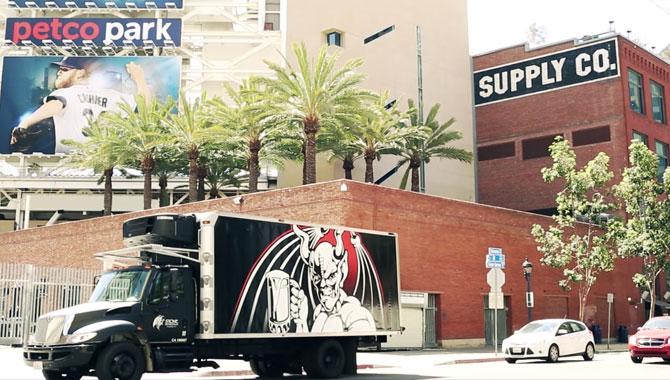
Despite months of rumors to the contrary, Stone Distributing Company (SDC) is not for sale.
In a memo to employees last week, Stone Brewing CEO Dominic Engels sought to quash talk that the San Diego craft brewing company was attempting to offload its distribution business.
“Rest assured of our commitment to SDC,” he wrote.
According to Engels, Stone Distributing remains “a key piece of Stone Brewing” and a “critical” piece to the company’s success in its largest market, California. He added that Stone is “committed to the continued growth of SDC.”
Indeed, Stone Distributing has grown into one of the largest craft beer wholesalers in the San Diego market. According to a March profile in San Diego Magazine, the more than two decades old wholesale business sells about 4.5 million cases of beer to more than 12,700 unique accounts annually. The business, which employs more than 300 workers, covers a 40,000-square-mile service area that reaches from southern San Diego to Santa Maria and covers Big Bear, Riverside County, Los Angeles and Inland Empire, according to the company’s website.
Beyond selling its own brands, Stone’s portfolio includes about 45 different craft brands, including popular California craft breweries Modern Times, Russian River, and Port Brewing, as well as offerings from national brands such as Boulevard Brewing, Brooklyn Brewery, Cigar City, Oskar Blue and Victory Brewing.
So where did rumors of a sale originate? Engels pointed to large wholesalers.
“In times of uncertainty, fueling rumors is common practice by large wholesalers who look to undermine retailer confidence in the alleged seller,” he wrote. “Given the success of SDC as the largest independent craft beer distributor, whenever there is activity in the market, SDC is a prime target.”
Engels’ memo follows several operational changes and cost-cutting measures made by Stone Distributing in recent months.

In a May 2 email to several brewery partners, Stone Distributing general manager David Watson wrote that the company would no longer set up chain authorizations for its supplier companies. Instead, Watson provided the company’s brewery partners with a how-to guide for setting up meetings at retailers such as Albertsons, BevMo, Costco, Target and others, as well as a spreadsheet of contacts.
“We are spending more time answering questions about procedures and ‘how to’s’ than we are selling and this hurts us both,” he wrote. “We are striving to create clear guidelines for both of us, with minimal duplication of effort so we can all win.”
Less than a week later, Stone Distributing notified brewery partners that it would begin discontinuing underperforming SKUs in June as part of an ongoing rationalization project. In an email to suppliers, Stone said cutting the number of SKUs would allow the company to give more “mindshare” to better-selling, year-round offerings.
This wasn’t Stone Distributing’s first culling of brands, however. The company previously eliminated SKUs not exceeding an established “hurdle rate” for certain package styles in December 2017, and again in July 2018. Moving forward, the company said it would run SKU rationalization projects twice a year.
Also, in mid-May letter, Watson informed some of Stone Distributing’s partners that it would no longer absorb freight costs associated with receiving products at its warehouses beginning in early May.
“As your partners, we have carried this burden for some time now and we are electing to shift the expense back to our suppliers,” he wrote. “Per your contracts with Stone Distributing, we are not responsible for covering the costs of shipping at our warehouses.”
Neither Watson nor a Stone spokesperson returned messages seeking comment as of press time.
The memo was sent to employees about a month after Stone Brewing sold its $30 million production brewery in Germany to BrewDog.
During last fall’s California Craft Brewers Association meeting in Sacramento, Stone co-founder Greg Koch became emotional as he discussed opening Stone Distributing out of necessity to keep Stone Brewing alive. Koch told attendees that his brewery struggled to find a wholesaler to carry its beer in the mid-1990s. Once Koch thought he’d found a Miller wholesaler to carry his brand, the wholesaler continually pushed back the rollout date before backing out of the deal altogether months later.
“What I heard was, ‘You know what, we’re going to let your company die,’” Koch said. “I was so scared.”
According to Koch, he never felt that way again after starting Stone’s distribution arm.
Update: Stone Brewing spokeswoman Lizzie Younkin told Brewbound that there is “no official” SKU reduction program underway.
“Any references you’re seeing to this is a normal part of business — our continued efforts to refine our portfolio,” she wrote, via email.
